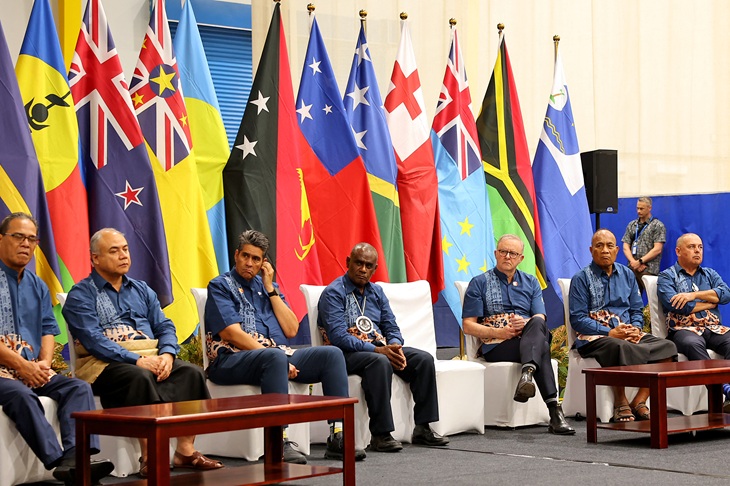
This photo taken on September 10, 2025, shows leaders of Pacific Islands nations, including Australian Prime Minister Anthony Albanese (3rd R), sitting together during the Pacific Islands Forum summit in Honiara, the capital of the Solomon Islands. Pacific Islands leaders opened an influential summit in the Solomons on September 10, with nations split over China's growing role in the region and alleged meddling in the meeting. (Photo by BEN STRANG / AFP) (Photo by BEN STRANG/AFP via Getty Images)
UPDATE: East Sepik Governor Allan Bird has sharply criticized Australia’s latest multi-billion-dollar defence treaty with Papua New Guinea (PNG), stating it stems from a deep mistrust of PNG politicians. In his remarks, Bird emphasized that Australia should not cave into what he describes as “blackmail” from corrupt political figures.
Bird’s comments underscore a crucial reality: the treaty is perceived as a desperate measure by Canberra to regain control and confidence in its relationship with PNG. He stated, “If we look at Australia’s aid in PNG over the last 15 years…the money has been spent largely for political rather than development purposes.”
The implications of this treaty are significant. As tensions rise in the Indo-Pacific region, Australia’s efforts to solidify its influence over PNG could backfire if not handled with care. Bird insists that Australia needs to focus on supporting PNG citizens directly, rather than merely placating politicians.
This urgent situation is unfolding as Australia seeks to strengthen ties with its Pacific neighbors, particularly in light of increasing Chinese investment in the region. Bird reported, “Right now, Chinese businesses are popping up all over the country. I have had more visits from Chinese companies looking to invest than from anywhere else in the world.” He noted that approximately 99.9 percent of investors he has met are Chinese, highlighting a potential shift in economic alliances.
Historically, PNG has been a crucial partner for Australia, with ties dating back to its time as an Australian territory. However, many experts argue that Australia has neglected its responsibilities, opting for financial aid over fostering genuine relationships. December 2004 findings from the Australian Strategic Policy Institute (ASPI) labeled PNG as one of Australia’s top three foreign policy challenges.
Governor Bird’s suggestion to pivot towards strengthening people-to-people relationships rather than relying on political agreements has gained traction. His call for a new educational initiative in Port Moresby to train Australians and PNG nationals in Melanesian history and culture could foster deeper ties and understanding.
Looking ahead, the Australian government faces pressure to recalibrate its strategy. Bird advocates for the establishment of a “Melanesian Kiap Scheme” to enhance collaboration between Australian and PNG educators and health workers. Additionally, he suggests that supporting a PNG National Rugby League team could improve cultural ties.
The urgency of this situation cannot be overstated. With potential shifts in alliances and rising foreign influence, Australia must act swiftly to redefine its approach to PNG. The next steps will be critical in determining the future of this vital relationship.
For now, all eyes remain on Canberra as it navigates this complex landscape, balancing national interests with the need for genuine partnership in the Pacific.






